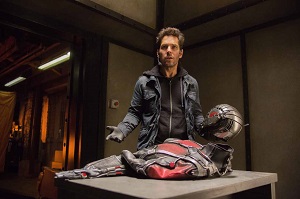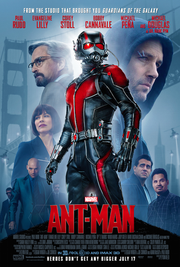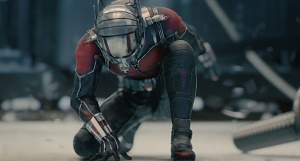“Forced out of his own company by former protégé Darren Cross, Dr. Hank Pym (Michael Douglas) recruits the talents of Scott Lang (Paul Rudd), a master thief just released from prison. Lang becomes Ant-Man, trained by Pym and armed with a suit that allows him to shrink in size, possess superhuman strength and control an army of ants. The miniature hero must use his new skills to prevent Cross, also known as Yellowjacket (Corey Stoll), from perfecting the same technology and using it as a weapon for evil.”
I know what many of you are thinking. “Here we go; another Marvel movie. How many does that make this summer, 20?”
Superhero fatigue has set in with a lot of casual moviegoers, and for good reason. It’s not exactly easy anymore keeping up with the central timeline that runs through Marvel’s Cinematic Universe, which despite the word “cinematic” also includes the television shows “Agents of S.H.I.E.L.D,” “Agent Carter,” and Netflix’s “Daredevil.” Between these shows and each of Marvel’s parallel franchises starring each respective member of The Avengers, for which a sequel was released just this past May, only hardcore fans have the time and perpetual excitement needed to stay on top of things.
And this isn’t even taking into account everything that DC is doing, which thankfully doesn’t include anything coming out this year.
My sympathies aside, Marvel’s latest attempt at launching another mega-budget franchise – “Ant-Man” – is worth you challenging your attention span. Like “Guardians of the Galaxy,” “Ant-Man” shines a spotlight on a lesser-known property that has the potential to earn greater appreciation than more established brands like Thor or Captain America. The reason for this is elegantly simple.
What helped make “Guardians of the Galaxy” so popular among so many demographics was its obvious self-awareness. I don’t mean that it was “meta” or somehow a parody or satire of itself. Rather, its self-awareness went only so far as to form the base of its brand of humor, which scoffed at the inherent melodrama woven into its story. All superhero movies and comics are melodramatic, for sure. But the particularly extreme absurdities of the characters and the plot allowed much more room for levity and base-line humor than usual. And that amount of humor precludes the film from conveying much of any weight in its overall tone, which works against the innate aims of melodrama.
“Guardians” had no intention of being another “Avengers” or “Iron Man.” It simply wanted to include as much silliness as it could without completely undercutting its relatively small-scale efforts at honest drama (e.g. Star Lord’s wistful remembrance of his mother). It turns out that “Ant-Man” was made with a similar mindset. However, it takes things even further.
During the course of the film’s fight scenes, and particularly its climax, both Ant-Man and his nemesis Yellowjacket switch back and forth furiously between their normal and miniscule sizes. The effects they have on their environments thus change accordingly, and it’s the occasional mismatching of the camera’s perspectives that spurs the movie’s funniest moments. Naturally, as the characters get small, our perspective zooms in so we can see them. And when we switch from seeing these miniature men up close in a relatively epic battle to seeing them as-is from afar, the change in perspective reveals the absurdity of their struggle. It is these moments which clearly poke fun at the story’s inherent melodrama in a much more on-the-nose way than “Guardians” ever did.

This near-total inversion of the use of melodrama can be seen as an admission on Marvel’s part that their stories can get downright silly in their grandiosity. However, this isn’t to say that it’s apologizing. Just like with “Guardians,” it wants the hearts of its characters taken seriously, even if those characters sometimes act like vaudevillians. This playing down of comic book-type histrionics is incredibly refreshing within the context of Marvel’s other franchises. Unfortunately, however, that relief probably won’t last long.
Marvel has plans for continuing its biggest franchises well into 2019. Those franchises – “The Avengers,” “Captain America,” “Thor,” etc. – rely on the same brand of melodrama that comic book movies have long since been known for, and which “Guardians” and “Ant-Man” have shown to subvert. Imagine if this two-pronged approach to comic book-style storytelling continued. A little bit of subversion on Marvel’s part shows a healthy attitude toward its own brand. But assuming Ant-Man’s license is set to grow like other Marvel characters,’ he and the upcoming “Guardians” sequel would only contrast with the flagship franchises more and more. Marvel would have to be willing to continue acting against its own interest of selling the concepts of scope and magnitude, which is about as realistic a prospect as any Marvel movie’s plot.
Go see “Ant-Man,” and enjoy its subversive humor while it lasts.





Leave a Reply
You must be logged in to post a comment.